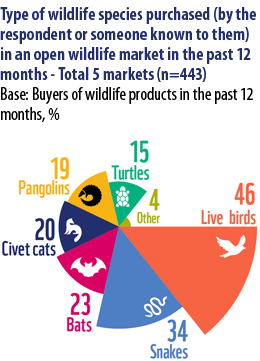World leaders urged to ban wildlife markets

As the world grapples with the worst public health emergency in recent memory, over 90 percent of respondents surveyed across Asia support government-led closures of illegal and unregulated wildlife markets, according to a new survey.
The new research for World Wildlife Fund (WWF), was made just as reports emerged from China that the country’s 'wet markets' have reopened — selling bats, pangolins and dogs for human consumption.
Scientists believe that the COVID-19 causing coronavirus first lurked in a bat in China and hopped to another animal, before getting passed on to humans.
Various reports suggest that a 55-year-old man from China's Hubei province could have been the first person to have contracted COVID-19 through one such 'wet market'.
Huanan Seafood Market in China's Wuhan is believed to be the epicentre of coronavirus, which swept the world, engulfing millions and killing over 75,000 do far.
A price list issued by one merchant at the market, which circulated on China’s internet in January, contained a smorgasbord of exotic wildlife including civets, rats, snakes, giant salamanders and even live wolf pups.
"The evidence is highly suggestive that the outbreak is associated with exposures in one seafood market in Wuhan," the World Health Organisation had said in a statement on January 12.
“The public in Asia have spoken - those living in countries where wildlife markets are most prevalent are demanding that wildlife consumption is curbed and illegal and unregulated wildlife trade is eliminated,” said Marco Lambertini, Director General of WWF International, in a statement.
“People are deeply worried and would support their governments in taking action to prevent potential future global health crises originating in wildlife markets,"
“It is time to connect the dots between wildlife trade, environmental degradation and risks to human health. Taking action now for humans as well as the many wildlife species threatened by consumption and trade is crucial for all of our survival,” he said.
The recent outbreak of COVID-19 has brought the link between zoonotic diseases - those transmitted from animals to humans - and wildlife markets into sharp focus.
The WWF conducted in March among 5,000 participants from Hong Kong SAR, Japan, Myanmar, Thailand, and Vietnam found that 82 percent of respondents are extremely or very worried about the outbreak, with 93 percent of respondents in Southeast Asia and Hong Kong supporting action by their governments to eliminate illegal and unregulated markets.
The Chinese government announced a comprehensive ban on the consumption of wild animals on 24 February. WWF’s research shows that citizens support similar actions from other governments across the region. This was the first survey of public opinion about the connection between COVID-19 and wildlife trade undertaken across Asia.
“China has taken great steps prohibiting the hunting, trade, transport and eating of wild animals, and Vietnam is working on similar directives,” said Christy Williams, Regional Director of WWF’s Asia Pacific program. “Other Asian governments must follow by closing their high-risk wildlife markets and ending this trade once and for all to save lives and help prevent a repeat of the social and economic disruption we are experiencing around the globe today.”
Nine percent of those surveyed by GlobeScan stated that they or someone they know had purchased wildlife in the past 12 months at an open wildlife market, but that 84 percent are unlikely or very unlikely to buy wildlife products in the future.
The World Health Organisation (WHO) has reported that the current COVID-19 pandemic, along with at least 61 percent of all human pathogens, are zoonotic in origin - wildlife trade is an aggravating risk in the spread of zoonoses. Other recent epidemics, including SARS, MERS and Ebola, have also all been traced back to viruses that spread from animals to people.
“COVID-19 is a global crisis and only a global response can ensure a pandemic like this never happens again," said Jan Vertefeuille, Senior Advisor for Advocacy at WWF-US.
"We’re calling on world leaders to support the closure of high-risk wildlife markets wherever they threaten public health and biodiversity and to take collective action: aid the countries that are trying to shut down this dangerous wildlife trade, invest in public education and consumer outreach to reduce demand for these products and fight wildlife trafficking around the world.”
Meanwhile, more than 200 conservation groups across the world have signed an open letter calling on the organization to do all it can to prevent new diseases emerging from wildlife trade and spreading into global pandemics.
The new joint letter calls on the WHO to recommend to governments worldwide that they bring in permanent bans on live wildlife markets and close down or limit trade in wildlife to reduce the threat to human health.
Conservationists say the WHO should work with governments and international bodies such as the World Trade Organisation to raise awareness of the risks the wildlife trade poses to human health and society.
At the same time, world leaders are receiving a science-based white paper from Humane Society International, warning that COVID-19 is “a tipping point that governments globally must not ignore” and asking governments to help the traders involved to find new livelihoods as quickly as possible.
Without action, “the emergence of another coronavirus-based disease in the future is a practical certainty”, the paper says.









